Recycling technologies – PET Flakes Manufacturing Plant Project Report 2024: Cost Analysis, Machinery Requirements and Profit Margin 05-04-2024
Recycling technologies
Crude Oil Prices Trend
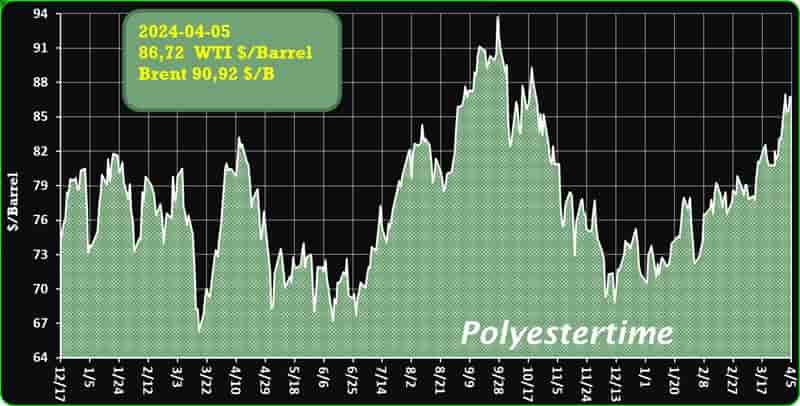
Crude Oil Prices Trend by Polyestertime
Ascend to increase prices on nylon polymers, compounds
Ascend Performance Materials, the leading producer of nylon 6,6, has announced a global price hike on its polyamide polymers and compounds effective April 15, 2024. The price increase applies to Neat PA66 polymer and PA6 and PA66 compounds, with a rise of $0.30/kg and €0.28/kg respectively. Customers are advised to connect with their sales representative for further details. Recycling technologies
Based in Houston, Texas, Ascend Performance Materials specializes in crafting high-performance materials for both everyday necessities and cutting-edge technologies.
With regional offices in Shanghai, Brussels, and Detroit, as well as manufacturing facilities across North America, Europe, and China, we are committed to innovating for a better tomorrow. Recycling technologies
Our diverse global workforce is dedicated to producing plastics, fabrics, fibers, and chemicals that contribute to safer vehicles, cleaner energy, improved medical devices, smarter appliances, and more durable apparel and consumer goods.
We prioritize safety, sustainability, and the success of our customers and communities in all that we do. Recycling technologies
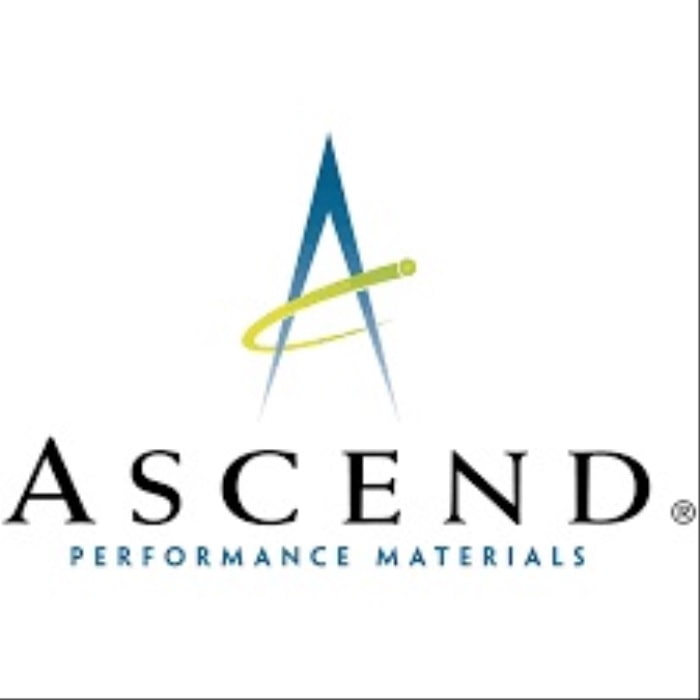
PET Flakes Manufacturing Plant Project Report 2024: Cost Analysis, Machinery Requirements and Profit Margin
Syndicated Analytics’ latest report titled “PET Flakes Manufacturing Plant Project Report 2024: Industry Analysis (Market Performance, Segments, Price Analysis, Outlook), Detailed Process Flow (Product Overview, Unit Operations, Raw Materials, Quality Assurance), Requirements and Cost (Machinery, Raw Materials, Packaging, Transportation, Utility, Human Resource), Project Economics (Capital Investments, Operating Costs, Profit Projections, Financial Analysis, Revenue), and Investment Opportunities” covers all the aspects including industry performance, key success, and risk factors, manufacturing requirements, project costs, and economics, expected returns on investment, profit margins, etc. required for setting up a PET flakes manufacturing plant. Recycling technologies
The study, which is based both on desk research and multiple waves of qualitative primary research, is a must-read for entrepreneurs, investors, researchers, consultants, business strategists, and all those who are planning to foray into the PET flakes industry in any manner.
What is PET flakes?
PET (Polyethylene Terephthalate) flakes are small pieces of recycled plastic derived from post-consumer PET bottles and containers, undergoing a process of cleaning, sorting, and shredding to produce uniform flakes suitable for reuse in various applications. The recycling process begins with collection and sorting of discarded PET bottles, which are then washed, sterilized, and crushed into small flakes. Recycling technologies
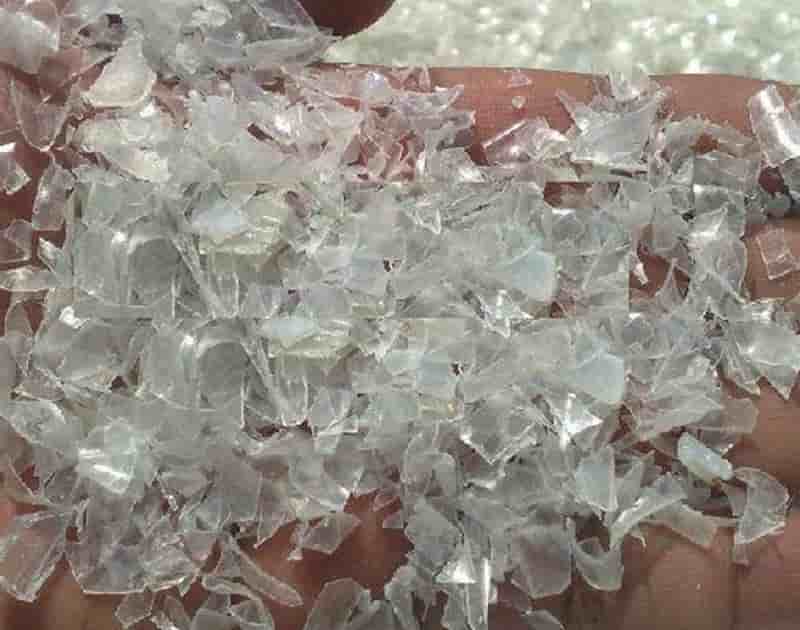
Trützschler’ Truecycled: A holistic approach to textile recycling success
Trützschler has taken a bold step to tackle the global problem of textile waste: We expanded our portfolio to become the first full-liner in the preparation of textile waste – from mechanical recycling to the spinning preparation of torn secondary fibers. Tearing and spinning preparation are both key processes for achieving the best possible quality from secondary fibers. That means our customers can tap into a competitive advantage by embracing this holistic approach. Recycling technologies
Our new complete TRUECYCLED solution is the result of our cooperation with the company Balkan Textile Machinery INC.CO. in Turkey, which we announced at the ITMA 2023 trade event in Milan. Since then, Trützschler has received many inquiries for recycling systems. More and more customers are now producing recycled yarns on a TRUECYCLED line: State-of-the-art recycling installations, configured and fine-tuned by Trützschler experts based on the customer’s specific requirements. Recycling technologies
Recycling systems face significant technological challenges. On average, torn fibers are much shorter thanvirgin fibers. The percentage share of short fibers in the fiber mass is much higher.
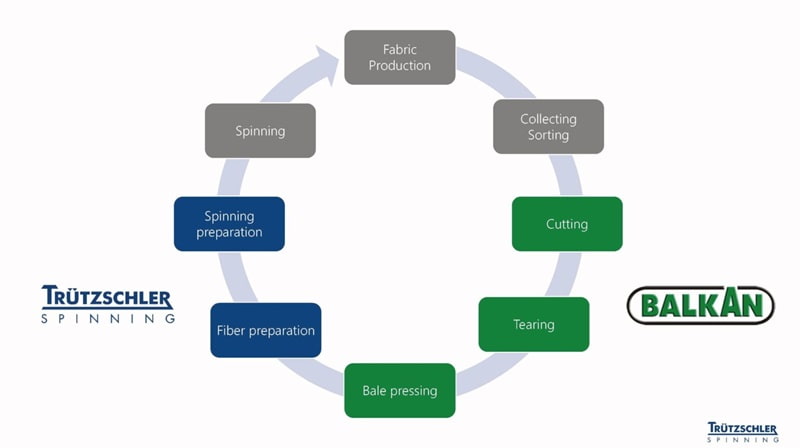
RadiciGroup High Performance Polymers has restructured its UK sales network, effective April 2, 2024
Plastoplan Polymers Ltd is now one of its primary distributors, handling a diverse range of products, including renowned brands like Radilon®, Radiflam®, Radistrong®, Raditer®, Heraflex®, Torzen®, Heraform®, and Raditeck®.
Plastoplan will exclusively distribute Renycle®, RadiciGroup’s sustainable technopolymers, derived from recycled post-industrial and post-consumer polyamide. This move addresses the escalating demand for eco-friendly products while upholding market standards of quality, reliability, and safety. Recycling technologies
John Rae, RadiciGroup High Performance Polymers’ UK Country Manager, expressed confidence in the partnership with Plastoplan Polymers, emphasizing the necessity of a strong, dependable collaborator to ensure top-notch quality and flexibility for British clientele.
Plastoplan Polymers (Hromatka Group), a significant player in the European polymer distribution market, already shares a fruitful partnership with RadiciGroup across multiple European nations. Kai Arnold, CEO of Plastoplan Polymers Ltd, noted the alignment of this new agreement with both partners’ shared strategy, focused on enhancing trade exchange and broadening the array of products and services available to UK customers, including logistics and technical support.

From left: Peter Shakeshaft and Kai Arnold of Plastoplan Polymers, John Rae and Abhi Sharma of Radici Plastics UK
New capabilities in Asia in bioBDO
Hyosung TNC plans to pioneer new capabilities in Asia with the production of biobased 1,4 butanediol (bioBDO) in Vietnam, integrating it into the manufacture of spandex fibers.
The initial plant aims for an output of 50,000 tons annually by 2026, with potential expansion to 200,000 tons per year across multiple facilities, requiring an investment nearing a billion dollars. Recycling technologies
Employing Geno BDO technology from Genomatica, the process utilizes fermentation of sugars, proven to slash carbon emissions by about 90% compared to traditional fossil-based BDO.
This initiative signifies a strategic shift towards sustainability.
The Vietnamese complex, declared by Hyosung, will establish the world’s premier vertically integrated facility for spandex polyurethane fiber production from sugarcane.
BioBDO manufactured in Ba Ria-Vung Tau will undergo conversion into PTMG at a nearby Dong Nai facility, further processed into regen BIO branded spandex fiber at the Dong Nai Spandex plant. Recycling technologies
This pioneering venture aligns with global trends towards eco-friendly materials and signifies Hyosung’s commitment to innovation and environmental responsibility.
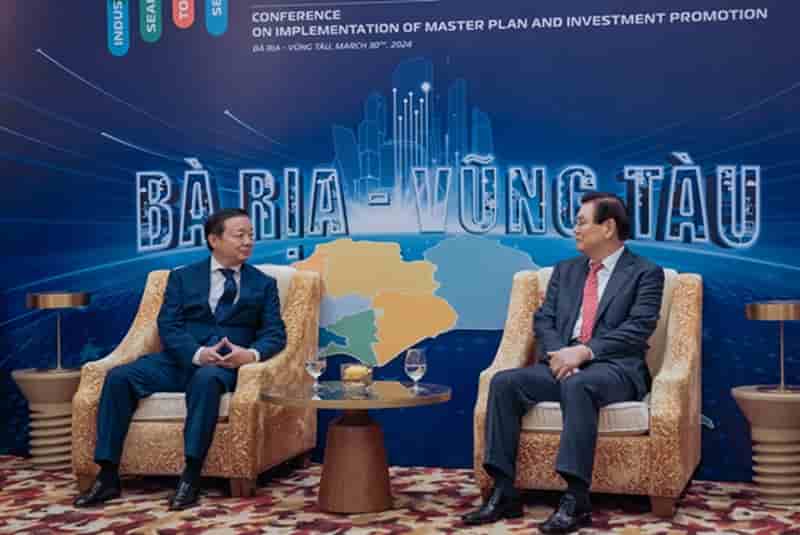
Japan’s First PS Chemical Recycling Plant Goes Online with Agilyx Technology
In a significant milestone for sustainable plastics management, Japan has inaugurated its first polystyrene (PS) chemical recycling facility. Denka and Toyo Styrene, two prominent Japanese chemical companies, have jointly completed the construction of this groundbreaking plant. The facility employs cutting-edge Agilyx technology to address the growing challenge of PS waste. Recycling technologies
The Birth of a Sustainable Solution
A Collaborative Effort
Denka and Toyo Styrene invested approximately JPY 4 billion (€24.6 million) in the construction of this state-of-the-art facility. The plant, located at Denka Chiba Factory, boasts a capacity to process around 3,000 tonnes of PS waste per year. This collaboration marks a significant step forward in Japan’s commitment to circular economy practices and environmental stewardship.
Agilyx Technology: The Driving Force
The heart of this recycling plant lies in the innovative technology provided by Agilyx. The US-based company specializes in advanced chemical recycling solutions. Their expertise in pyrolysis—a process that breaks down plastics into their constituent monomers—has been harnessed to create a sustainable solution for PS waste. Recycling technologies
Pyrolysis: Transforming Waste into Resources
The new facility utilizes a pyrolysis modular system developed by Agilyx. Here’s how it works:
- Collection and Preparation: Post-use PS waste is collected and prepared for processing.
- Pyrolysis: The waste undergoes controlled high-temperature pyrolysis, breaking down the PS polymer chains. This results in the production of styrene monomers.
- Monomer Recovery: The styrene monomers are recovered and can be used to create new PS products or other materials. Recycling technologies
By converting PS waste back into its raw material form, this recycling process significantly reduces the environmental impact of discarded plastics. It also helps close the loop, ensuring that PS waste doesn’t end up in landfills or incinerators.
A Blueprint for the Future
Japan’s PS chemical recycling plant sets a precedent for other nations and industries. As global awareness of plastic pollution grows, more companies and governments are seeking sustainable alternatives. Agilyx’s technology, combined with the commitment of Denka and Toyo Styrene, demonstrates that circular solutions are not only feasible but also economically viable.
Conclusion
The opening of Japan’s first PS chemical recycling plant is a beacon of hope in the fight against plastic waste. Recycling technologies
As we move toward a greener future, collaborations like this one will play a pivotal role in preserving our planet for generations to come.
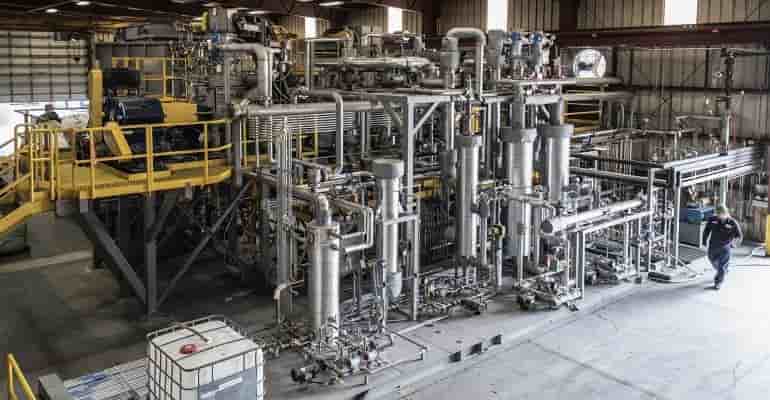
Toray develops chemically recycled BOOP film for polymer bank notes
Toray Plastics America, a subsidiary of Japan-based Toray, has achieved a significant milestone in the world of polymer banknotes . For the first time, they have developed a chemically recycled BOOP (Biaxially Oriented Polypropylene) film that is being used to produce polymer banknotes . Recycling technologies
Here are the key details:
Background:
-
- Polymer banknotes, which replaced paper currency, were first introduced by Australia in 1988. Since then, over 60 countries have adopted this technology due to its longevity, cost-effectiveness, and advanced security features.
- The polymer of choice for these banknotes is Biaxially Oriented Polypropylene (BOPP) film.
- Security Challenge:
- One of the critical security challenges in polymer banknotes is ensuring that the BOPP substrate cannot be easily counterfeited.
- To address this, security tags are embedded into the BOPP film during the extrusion process, resulting in highly transparent film with a thickness between 60 and 80 microns. Recycling technologies
- Recycled Content:
- Toray Plastics America has taken a groundbreaking step by using attributed recycled content in their new polymer banknotes.
- They achieved this by developing the BOOP film using ExxonMobil’s ISCC Plus certified recycled polymers.
- The recycled content is attributed via a mass balance method, meaning that for every kilogram of polymer utilized in the substrate, an equal amount of polymer was recycled and repurposed as part of a sustainable supply chain. Recycling technologies
- Exclusive Partnership:
- Toray Plastics America is the exclusive partner of Spectra Systems Corporation, a US-based banknote security company.
- Spectra Systems Corporation is producing these innovative polymer banknotes.
- Upcoming Launch:
- Spectra Systems will unveil this new substrate at the Banknote 2024 conference in Fort Worth, Texas, from May 13 to 16.
This development marks a significant leap forward in sustainable currency production, combining advanced security features with environmentally responsible practices.
It’s exciting to see mass balance plastics being used in polymer banknotes for the first time! Recycling technologies
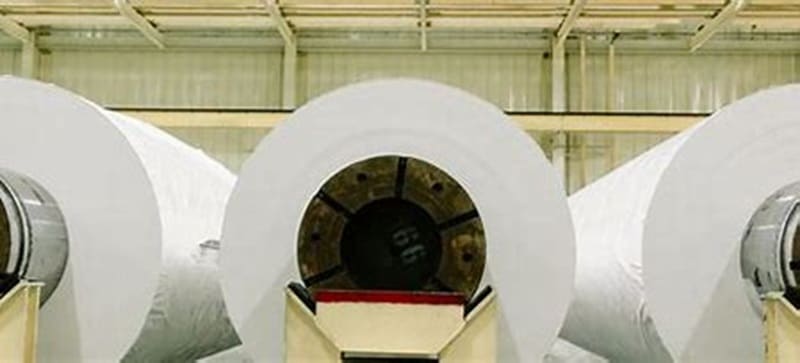
Recycling technologies
